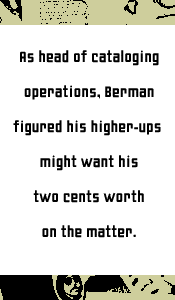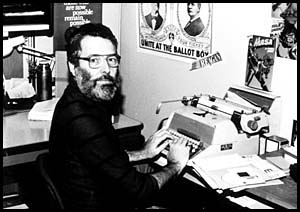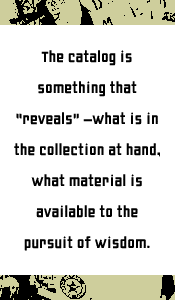|
To understand his professional demise, it is necessary to know
that Sandy Berman has always had a tendency to rant. Contributing to
the 1972 underground anthology Revolting Librarians, Berman
bemoaned at length the collections of most public libraries in the
U.S., which he characterized as stodgy preserves of the elite: "How
in hell can the pothead groove on Business Week and Norman
Vincent Peale? A feminist get excited over Cosmopolitan and
the Ladies Home Journal? Or an acid-rock fancier find any
goodies in the Reader's Digest? It ain't easy. Still,
longhaired freaks and madassed revolutionaries are as much members
of the community as Big Money Makers and hard-hat 'straights.'"
 The
Chicago-born and Los Angeles-raised Berman was perhaps predisposed
to a touch of raucous crusading: "I would say that my folks were
good Roosevelt Democrats. It would be fair to characterize the
matrix that I grew up in as somewhat, okay, here's the key word
coming up, secular Jewish radicalism or liberalism." To
borrow a phrase from a speech he once heard I.F. Stone deliver,
Berman describes himself as "a pious Jewish atheist" who has long
been devoted to books, education, and the tip feather of left-wing
politics. The
Chicago-born and Los Angeles-raised Berman was perhaps predisposed
to a touch of raucous crusading: "I would say that my folks were
good Roosevelt Democrats. It would be fair to characterize the
matrix that I grew up in as somewhat, okay, here's the key word
coming up, secular Jewish radicalism or liberalism." To
borrow a phrase from a speech he once heard I.F. Stone deliver,
Berman describes himself as "a pious Jewish atheist" who has long
been devoted to books, education, and the tip feather of left-wing
politics.
After earning his master's degree in Washington, D.C., Berman
worked at libraries in that city and overseas, as a civilian for the
army in Germany during the Sixties. But what radicalized him, he
says, was his time in Zambia, where he lived with his two children
and his wife Lorraine Berman (she died five years ago, after
suffering a burst aneurysm in her brain). There he served as an
assistant librarian at the University of Zambia Library in Lusaka
for two years starting in November 1968. As in most libraries, the
collection there used Library of Congress subject headings, which
included the word kafirs to refer to black South Africans.
Several of his black colleagues told Berman that to be called
"kafir" was akin to being called "nigger" in America. An incensed
Berman investigated, and his research led him to question a host of
other labels used by libraries around the world--a line of inquiry
that pried the lid off a Pandora's box of controversial subject
headings and, eventually, established Berman's reputation as an
unyielding advocate for unbiased language.
The Washington, D.C.-based Library of Congress is the national
library of the U.S. Its classifications and cataloging of library
materials under various headings set the standard for how libraries
typically organize their stock and how users can find them through a
database. Berman launched his first full-scale assault on the
Library of Congress ("LC" in library parlance) in 1971, with the
publication of Prejudices and Antipathies: A Tract on the LC
Subject Heads Concerning People. Throughout the book, Berman
railed against what he took to be the Eurocentric,
Christian-oriented, male-dominated, establishment-pimping LC subject
headings. On the heading "Jewish Question," Berman wondered, "What
was (and in many places still is) the 'Jewish Question'? Who posed
the 'question'? And what kind of 'answer' did they furnish?" Berman
pressed on: "The phraseology is that of the oppressor, the ultimate
murderer, not the victim. Strong language? The stench of Auschwitz
was stronger." He concluded that the heading "richly merits
deletion" from the Library. The LC got around to doing just that,
some 12 years later, in 1983. Berman similarly suggested abolishing
the heading "Yellow Peril," which he placed "with gutter epithets
like 'slope,' 'gook,' and 'chink.'"

At work in
1973, Berman's first year as head cataloger for the Hennepin
County Library
Courtesy of Chris
Dodge | Agitating for such
deletions, and for positive additions, is a crusade Berman never
abandoned. In the decades after accepting the position of head
cataloger for Hennepin County in 1973, Berman frequently took to the
lecture circuit, offering his unconventional thoughts on library
issues at professional conferences and other venues. When delivering
speeches Berman would often rely on a light bulb as a prop, which he
would hold aloft and ask his audience to identify. Light bulb, you
say? Not to the Library of Congress, he'd explain, for whom the
correct answer is "electric lamp, incandescent." Such convoluted
labeling, Berman believed, did little to promote the nation's
16,000-plus public libraries as storehouses of knowledge designed
for citizens who know a light bulb when they see one.
Hennepin County first levied taxes for a library system in 1922;
today its 26 libraries have a combined annual budget of $29.2
million and about 700 employees. Serving more than 700,000 patrons
in the suburban metropolitan area, it is ranked as the 46th largest
system in the nation in terms of patronage. This year HCL was rated
as the fifth best large library in the U.S. by American
Libraries magazine. HCL acquires about 250,000 new items
annually, and its catalogers create some 30,000 new bibliographic
records every year. The 26 county libraries currently have at least
1.6 million materials on hand--books, CDs, videos, periodicals, all
detailed in a massive online catalog by author, editor, publisher,
publication date, page count, content description, and, of course,
subject headings--the most crucial means by which patrons are able
to find materials on the shelves.
 It was at
his Hennepin County post that Berman opened another front in his
crusade by promoting the inclusion of hundreds of new subject
headings at the Library of Congress. In periodic memos to the LC
staff--memos that amounted over the years to a barrage--he proposed
innumerable headings as commonsense alternatives to the convoluted
language of the Library (for instance, "toilet" instead of "water
closet"). But what set Berman's course, and what set him apart as an
unorthodox cataloger, was the suggestion of entirely new categories
for the county's material--books and articles and new media Berman
and his Sandynistas identified as covering topics just coming into
existence in the world--computer-technology information, say. It was at
his Hennepin County post that Berman opened another front in his
crusade by promoting the inclusion of hundreds of new subject
headings at the Library of Congress. In periodic memos to the LC
staff--memos that amounted over the years to a barrage--he proposed
innumerable headings as commonsense alternatives to the convoluted
language of the Library (for instance, "toilet" instead of "water
closet"). But what set Berman's course, and what set him apart as an
unorthodox cataloger, was the suggestion of entirely new categories
for the county's material--books and articles and new media Berman
and his Sandynistas identified as covering topics just coming into
existence in the world--computer-technology information, say.
As head cataloger Berman would issue regular updates on new
subject headings created by his cataloging staff. The report for
April/June 1998 lists more than 200 terms, and it reads like a
veritable what's what of contemporary thought, a map by which to
explore the social frontier: Internet crime, anal fisting, bistro
cookbooks, country music festivals, dental dams, dog astronauts, gay
athletic coaches, Jewish-Canadian autobiographies, liquor industry
executives, narcoleptic women, new paradigm churches, Take Our
Daughters to Work Day, working class women's writings, xenophobia in
language, young Chinese-American women, suicide pacts.
Berman is quick to argue that he and his staff weren't in the
habit of creating subject headings just for the hell of it; rather,
it was work done in response to material that was already in the
database, but had been lumped in with stock where it didn't belong
or, more often, had been labeled in such a way as to make it nearly
impossible for patrons to find. "It doesn't mean that one approves
of anal fisting by virtue of having a book on it or creating a
subject heading for it," Berman reasons. "It just means that, look,
this is the theme, or the subject that's treated in this particular
material, and this is where it is." The objective, he stresses, was
simple: to fulfill the public library's mission--that of providing
patrons with information as readily as possible.
«PREVIOUS
PAGE || NEXT
PAGE»
|1
|2
|3
|4
|5
|6
|
|